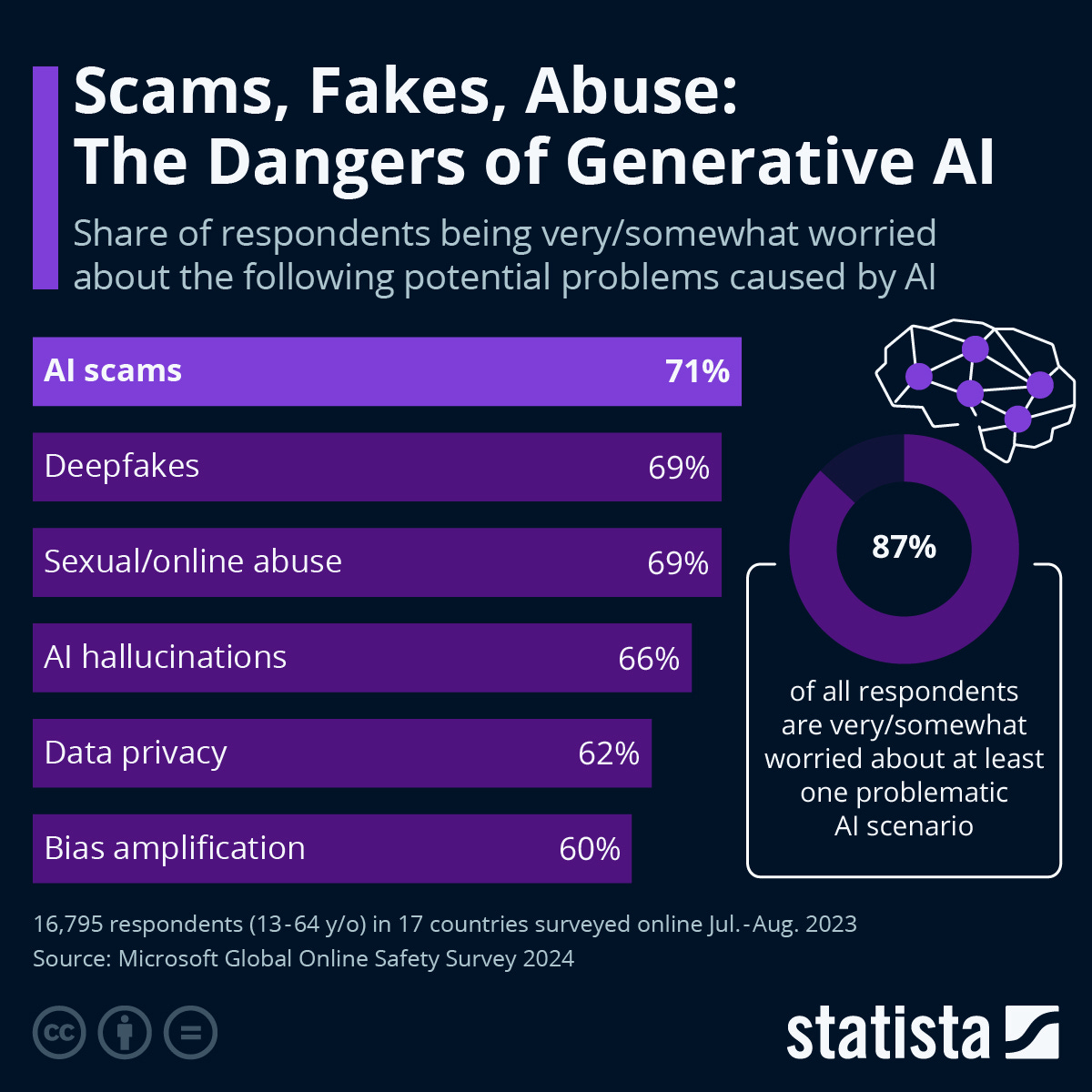The Futures - No. 53
Peak oil is coming / AI-powered scams increasing / A vaccine effective against all strains
In this issue
The Quantumrun team shares actionable trend insights about global oil demand slowing down, cybercriminals increasingly using AI for scams, a vaccine that works against all virus strains, and high-end vacations offering “longevity” treatments.
Future signals to watch
Scientists at UC Riverside have developed an RNA-based vaccine that effectively targets a common component of the viral genome, making it universally effective against all strains of a virus and safe for use in all populations, including infants and the immunocompromised.
This innovative approach could potentially eliminate the need for annual reformulations of vaccines like influenza and COVID-19, simplifying vaccine protocols and enhancing global health security.
Countries like Tuvalu and Singapore are creating digital twins of their lands to plan for natural disasters, such as flooding and storms.
In 2023, China's lithium-ion battery production was equivalent to the global demand, highlighting the challenges new entrants face due to the existing surplus in China’s manufacturing capacity.
Stanford University's 2024 AI Index reports significant advances in AI, with models now performing complex visual reasoning and high-level mathematics, achieving near-human or superior levels in benchmark tests.
In April 2024, Meta announced Meta Llama 3, its next-generation model featuring advanced reasoning capabilities and state-of-the-art performance across diverse industry benchmarks.
Boeing aims to enter the Asian flying car market by 2030 to cater to the demand for quick, short-distance travel in the region's congested cities.
University of New Mexico researchers have found that microplastics consumed in food and water can cross the intestinal barrier and accumulate in sensitive organs, including the brain. (Humans ingest approximately the weight of a credit card in microplastics weekly).
The latest trend in the wellness industry: longevity vacations. These luxurious getaways offer comprehensive health packages, including a USD $1,800 test to detect early cancer.
Forward this email to a friend and help The Futures reach a wider audience :)
Culturally // Trending
YouTube → Transformers One // X → Rapper Mona Lisa // Reddit → Steve Job’s $400k letter // TikTok → Grocery haul // Instagram → Civil War’s AI-generated posters // Spotify → “Espresso”
🛢️ Peak oil is coming, driven by demand and no longer supply
The global demand for oil, following an unusual spike during the post-COVID-19 pandemic recovery, is seeing a significant shift. According to the International Energy Agency (IEA), oil demand is projected to increase by 1.2 million barrels per day (mb/d) in 2024 and by 1.1 mb/d in 2025, indicating a stabilization rather than the rapid growth seen in previous years.
This anticipated peak in oil consumption within the decade is largely due to technological advancements in electric vehicles (EVs) and renewable energy sources, as well as a general deceleration in economic growth post-pandemic. Notably, China, which historically contributed immensely to oil demand growth, is experiencing a slowdown, with projected gains in 2024 expected to be just 540 thousand barrels per day (kb/d), reflecting broader economic cooling and increased adoption of alternative energy technologies.
Annual global oil demand growth

The impact on the aviation industry also underscores the changing dynamics of oil demand. Airportia data shows demand for air travel moderating after a post-pandemic surge, which can slow jet fuel demand growth. IEA forecasts demand for jet fuel in 2024 to rise by only 230 kb/d, a decrease from previous years. This is attributed to advancements in aircraft fuel efficiency, which has risen significantly since 2019. The integration of more fuel-efficient aircraft into fleets is a trend set to continue, directly influencing the lesser demand for oil in the aviation sector even as global travel recovers.
Moreover, the geopolitical landscape of oil is evolving. The dominant oil producers, particularly in the Middle East, are poised to gain market power as global oil demand plateaus. This shift from a supply-driven to a demand-driven oil market introduces new economic and political dynamics.
Countries like Saudi Arabia are likely to increase their market share significantly, while others with costlier and more carbon-intensive oil production might face economic challenges. This could lead to financial instability similar to the Latin American debt crises of the 1980s, which were also tied to oil price fluctuations. To mitigate these risks, strategic diversification and investment in renewable technologies are necessary steps for oil-dependent economies.
Actionable trend insights as global oil demand plateaus:
For entrepreneurs
Entrepreneurs can offer specialized consulting services that focus on transition strategies for industries heavily reliant on oil price fluctuations like shipping, aviation, and manufacturing. A consulting firm could provide tailored transition plans that focus on onshoring and nearshoring, energy efficiency audits, and implementation strategies for adopting alternative fuels like biofuels, hydrogen, or electric solutions.
Engineering innovators can develop ideas for synthetic fuels derived from carbon capture technologies. For example, they could develop modular carbon capture units that can be installed at small to medium-scale emission sources, like local manufacturing plants, to capture carbon and produce fuels onsite.
For corporate innovators
Utility and energy companies can diversify their business models by recycling and repurposing oil infrastructure, such as pipelines and refineries, into geothermal energy systems. For example, such companies could use decommissioned oil pipelines to transport heated fluids from geothermal wells to urban centers for heating purposes.
Logistics and transportation businesses can pivot towards hybrid and fully electric heavy-duty vehicles. For example, a logistics company could partner with EV manufacturers to develop customized battery solutions that cater to specific freight needs, such as long-haul deliveries.
For public sector innovators
Non-oil-producing nations can further invest in public transportation—especially rail and urban subway networks—and mandate the expanded installation of EV charging infrastructure to reduce domestic exposure to costly future energy price fluctuations.
Second-tier oil-producing nations may need to consider accelerating public-private partnerships with Western oil and gas companies to accelerate the infrastructure investments in their oil-producing fields. If they can reduce the cost of oil extraction over the next five years, they can potentially retain their share in the future demand-driven energy markets.
Trending research reports from the World Wide Web
There are 1,369 unicorn startups (billion-dollar startups) as of March 1, 2024, according to Pitchbook. The top unicorns include Chinese tech company Bytedance, US paytech Stripe, and Elon Musk-owned SpaceX.
According to Deloitte’s 2024 Higher Education Trends, colleges and universities, once hailed as drivers of social mobility, are now often perceived as enablers of inequality, challenging leaders to enhance the perceived value of higher education to serve diverse stakeholders.
KPMG predicts that countries across North America, the European Union, and other regions will increasingly adopt regulations to ensure pay equity and transparency, with legal and management teams actively preparing to manage compliance and reputational risks.
According to AXA's 2024 "Mind your health in the workplace" report, only half of 18-24-year-olds report not having a mental health condition, attributing their concerns largely to technology addiction, social media, body image, and future uncertainty.
💰 AI-powered scams on the rise
The Financial Stability Oversight Council has warned that the rapid integration of artificial intelligence (AI) in financial systems could pose significant risks if not properly supervised. The report specifically highlights concerns about "safety and soundness risks," such as vulnerabilities to cyberattacks and flaws in AI modeling that could lead to unexpected financial behavior or exploitation. These risks are worsened by AI's ability to process vast amounts of data and execute complex transactions at speeds unattainable by humans, potentially outpacing current regulatory measures.
The malicious use of AI technologies in cybercrimes is becoming increasingly sophisticated and costly. In February 2024, cybercriminals employed AI-generated deepfakes in a scam that led to a Hong Kong company's employee mistakenly transferring $25 million, believing they were interacting with their Chief Financial Officer (CFO). In its 2023 annual report, identity fraud firm Sumsub highlighted AI-powered scams, especially deepfakes, as a major threat among the top five identity fraud challenges this year.
There was a global tenfold rise in deepfakes (a 1,740% increase in North America), and Sumsub cautioned that these fake videos are likely to become more sophisticated and difficult to identify by 2024.

Meanwhile, the UK's National Cyber Security Centre (NCSC) has issued a warning about the challenges in distinguishing between legitimate emails and AI-generated ones, particularly as AI enhances the realism of phishing attacks. The NCSC explains that generative AI technologies, which can create convincing text, voice, and images from simple prompts, has made these tools widely accessible, complicating the detection of cyber threats.
This advanced AI capability is likely to significantly increase the frequency and severity of cyber-attacks by 2025. The NCSC also noted that these AI-driven technologies will make it harder to identify various forms of cyberattacks, including spoofing messages and social engineering efforts aimed at extracting confidential information.
Actionable trend insights as cybercriminals use generative AI for scams
For entrepreneurs
Security professionals can establish specialized in-person and online training centers focused on teaching corporate teams and individual professionals about behavioral cues and psychological tactics commonly used in AI-generated scams. For example, a workshop could simulate a series of interactions where participants must decide whether a message is from a legitimate source or a sophisticated AI-driven scam, enhancing their intuitive and critical assessment skills without relying solely on digital tools.
For corporate innovators
Companies can invest in creating digital "passports" for their high-level executives, secure profiles incorporating biometric data, voice prints, digital signatures, and even physical devices, all verified through blockchain technology. For instance, before a significant transaction is authorized, the digital passport could be used to confirm the identity of the involved parties through a multi-factor authentication process that includes voice verification calls and real-time biometric checks.
Companies offering financial services can implement AI-driven verification protocols that utilize unique interaction histories to identify anomalies in customer requests. For example, if a request for account changes or sensitive information does not match the typical pattern or history of a customer's previous interactions, the system could automatically require additional verification steps before proceeding.
For public sector innovators
Governments can create and distribute AI literacy programs tailored to help citizens and businesses recognize AI-driven scams. For instance, a public campaign could use AI-generated content to simulate scams in a controlled environment, allowing users to experience and learn to identify deceptive tactics safely.
Regulatory bodies overseeing telecommunications and digital trade can legislate the use of next-generation "digital authenticity" tools and protocols across domestic communication platforms, such as email and social media, used for business transactions. For example, any digital communication involving monetary transactions or sensitive data requests could be screened through these tools to ensure the content's integrity before it reaches the recipient.
Outside curiosities
There’s now a term for going to the grocery store intending to buy necessities and coming out with unnecessary purchases: blackout shopping.
Spotify has confirmed that its premium plans featuring both music and audiobooks will result in a reduced mechanical royalty rate for songwriters, although it asserts that creator earnings will still increase.
Meta is introducing beta real-time AI image generation through prompts for WhatsApp users in the US.
Gen Z workers no longer need office besties.
This physical therapy humanoid robot.
More from Quantumrun
Read more daily trend reporting on Quantumrun.com
Subscribe to the Quantumrun Trends Platform (free for premium newsletter subscribers).
Corporate readers can review our Trend Intelligence Platform
Email us at contact@quantumrun.com with questions or feedback.
Finally, share your thoughts in the Substack comments below. We love hearing from you!
Interested in collaborating with the Quantumrun Foresight team? Learn more about us here.
See you in The Futures,
Quantumrun






